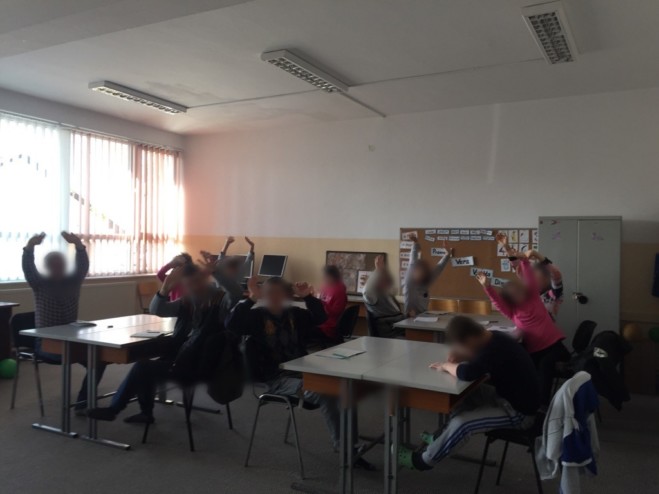A former student of a special classroom in “Ali Kelmendi” primary school in Vushtrri maintained a close connection with this educational institution. To this day she visits her former teachers daily.
In the meantime, D.H has also finished high school for students with special needs in Prizren.
Her first teacher, Fidane Maxhuni, remembers her as a student who was “kind and dear to all.”
A classroom with 12 students with special needs, such as Down syndrome, autism, speech and hearing impediment etc. still exists in “Ali Kelmendi” school. Two teachers use different games to teach boys and girls, aged 8 to 19.
A 16-year-old boy with Down Syndrome, who insisted to remain anonymous, in a short conversation, tells us how much he enjoys time in the class.
“I like doing homework, listening to my teacher and playing with my classmates. I get along fine with other students, too,” he says.
Despite the special requirements regarding these students, the school lacks basic stationery including notebooks, pencils and books…
“The school budget is not sufficient to cover all the requirements. The only fund we have received are those from private institutions and nothing from the state,” says teacher Maxhuni.
Donations – blackboards, identity cards, notebooks, pencils, geometrical shapes, carpets, curtains etc. have been so far received from the Danish KFOR and OSCE.
Agim Miftari, the director of Education in the municipality of Vushtrri, agrees that there is no special budget for these students, though he considers that the school has the necessary conditions for development.
“For the last two years transport for these students was financed from the budget of Vushtrri’s municipality. A few years ago, all the funds that were given to these students from MASHT was spent for transport. The remaining funds were used for the basic needs in the classroom,” he says.
The teaching process is according to the curricula designed by the Ministry of Education.
Kadrije Meniqi, former principal of this school, who now works as an official in the municipality of Vushtrri, says that teachers there are specialized in dealing with students with special needs.
“Teachers were trained in the Resource and Advising Center in “NënëTereza” school in Mitrovicë,” she says.
Teacher Fidane Maxhuni, who has a master’s degree in psychology and is certified by MASHT, and Tefide Krasniqi who has completed trainings as an educator, have been working with children with special needs of this primary school for almost 15 years.
They work with students individually, however sometimes there is also in group, depending on the need for further explanations or repetition of what was already learned.
Tefide Krasniqi, who has completed a professional training with Finnish experts, says that students with special needs are taught basics, the information that is appropriate for them.
“Lack of assistants in this school makes better teaching quality impossible. They are in constant need of an assistant, someone to clarify and simplify things for them,” she says for KosovaLive.
Although not the main problem, the school also doesn’t provide meals and this can affect students’ concentration during classes.
“A year ago they were provided a croissant a day, but this year no food is provided. We have repeated the request for providing meals to students of this school but the school hasn’t answered yet,” says teacher Maxhuni.
However not all students with special needs are included in this particular class, some of them are in other classrooms. According to the principal of this primary school “Ali Kelmendi”, Milazim Hyseni, six students have been placed in regular classrooms and they socialize with other students.
Eroll Venhari, director of Health and Social Welfare of this town, says that they are working hard to integrate these students in society.
“Some of these kids are so bright they leave you speechless.” We have a project called “Domestic Care” consisting of 4 doctors and 8 nurses. For children with special needs and all others who are unable to travel to the town, this team provides home assistance for free,” he says.
On the other hand, Hava Maloku, a teacher of this school, says that the absence of assistants hinders students’ development in learning.
“Two years ago I had a student who had trouble learning and was in need of an assistant, though that was not possible. Consequently, he lagged in learning and had to repeat the class,” she says.
Apart from the friendship among between each other, these students have also another friend with whom they meet each day.
BajramHaziri takes them from home to school and other way around, each day. He has been eagerly doing this for 15 years.
“I never had any problem with these students. A few years ago we had more serious cases whom I had to carry myself from the van to the classroom. I love doing this as if I were their parent,” he says.
This closeness is a great assistance for families of these children, too, especially for those with economic hardships. It Is also helpful for the children’s daily life.
A stronger institutional support for people with special needs would however, be more than welcomed.
Fikrije Gashi, parent of a special needs student, says that the monthly assistance of 100 euros that she gets from the municipality of Vushtrri doesn’t cover even the basic needs of her child.
Shkurtë Spanca








